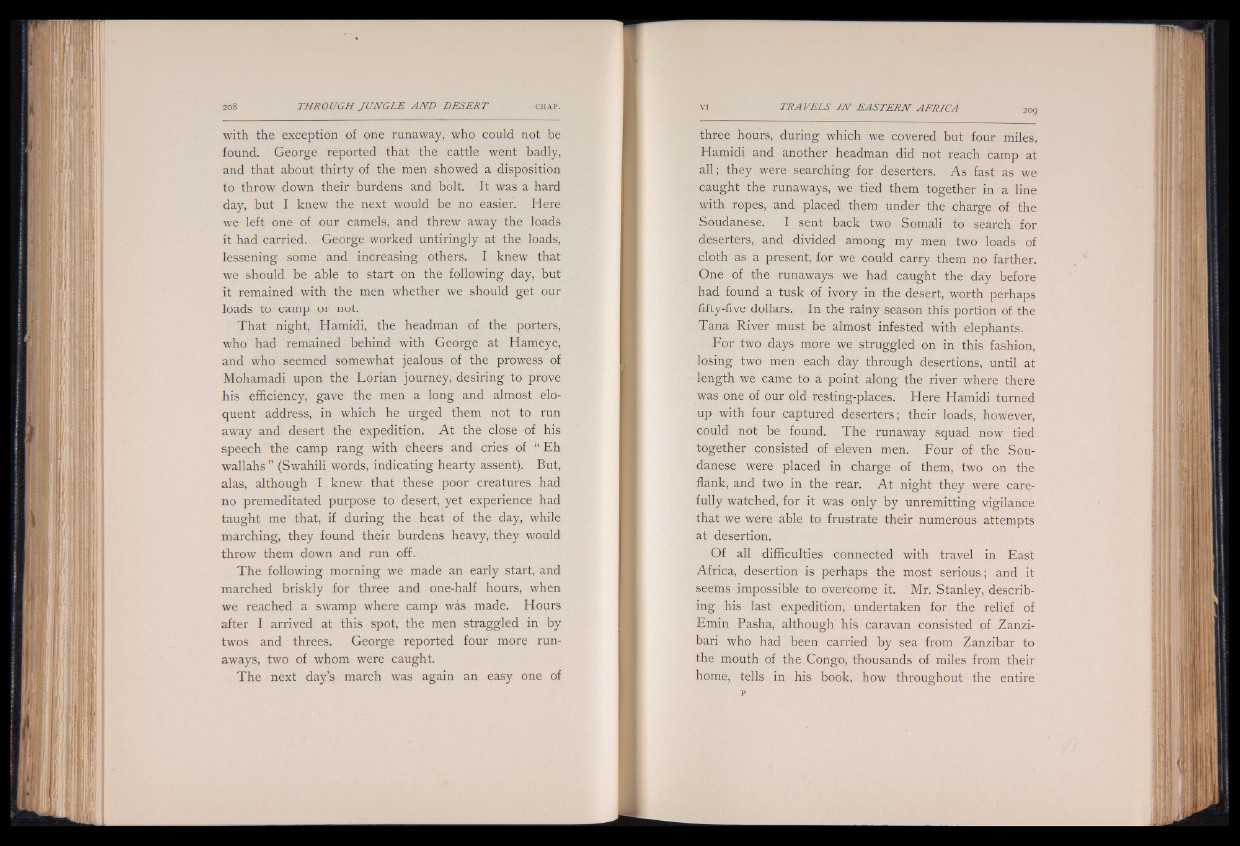
with the exception of one runaway, who could not be
found. George reported that the cattle went badly,
and that about thirty of the men showed a disposition
to throw down their burdens and bolt. It was a hard
day, but I knew the next would be no easier. Here
we left one of our camels, and threw away the loads
it had carried. George worked untiringly at the loads,
lessening some and increasing others. I knew that
we should be able to start on the following day, but
it remained with the men whether we should get our
loads to camp or not.
That night, Hamidi, the headman of the porters,
who had remained behind with George at Hameye,
and who seemed somewhat jealous of the prowess of
Mohamadi upon the Lorian journey, desiring to prove
his efficiency, gave the men a long and almost eloquent
address, in which he urged them not to run
away and desert the expedition. A t the close of his
speech the camp rang with cheers and cries of “ Eh
wallahs ” (Swahili words, indicating hearty assent). But,
alas, although I knew that these poor creatures had
no premeditated purpose to desert, yet experience had
taught me that, if during the heat of the day, while
marching, they found their burdens heavy, they would
throw them down and run off.
The following morning we made an early start, and
marched briskly for three and one-half hours, when
we reached a swamp where camp was made. Hours
after I arrived at this spot, the men straggled in by
twos and threes. George reported four more runaways,
two of whom were caught.
The next day’s march was again an easy one of
three hours, during which we covered but four miles.
Hamidi and another headman did not reach camp at
all; they were searching for deserters. As fast as we
caught the runaways, we tied them together in a line
with ropes, and placed them under the charge of the
Soudanese. I sent back two Somali to search for
deserters, and divided among my men two loads of
cloth as a present, for we could carry them no farther.
One of the runaways we had caught the day before
had found a tusk of ivory in the desert, worth perhaps
fifty-five dollars. In the rainy season this portion of the
Tana River must be almost infested with elephants.
For two days more we struggled on in this fashion,
losing two men each day through desertions, until at
length we came to a point along the river where there
was one of our old resting-places. Here Hamidi turned
up with four captured deserters; their loads, however,
could not be found. The runaway squad now tied
together consisted of eleven men. Four of the Soudanese
were placed in charge of them, two on the
flank, and two in the rear. A t night they were carefully
watched, for it was only by unremitting vigilance
that we were able to frustrate their numerous attempts
at desertion.
Of all difficulties connected with travel in East
Africa, desertion is perhaps the most serious; and it
seems impossible to overcome it. Mr. Stanley, describing
his last expedition, undertaken for the relief of
Emin Pasha, although his caravan consisted of Zanzibari
who had been carried by sea from Zanzibar to
the mouth of the Congo, thousands of miles from their
home, tells in his book, how throughout the entire